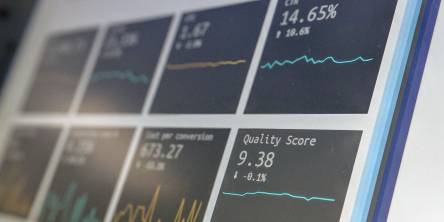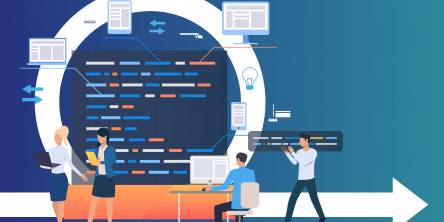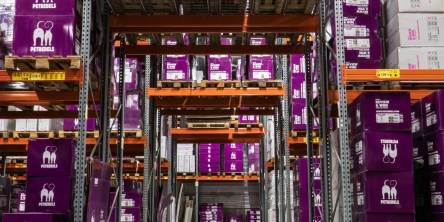Track your Business in Real Time - Real Time Delivery Tracking Benefits
On-demand delivery is a growing trend around the world, and businesses are coming up with innovative solutions to cater to and meet timely delivery expectations. These are customer-centric times and this has opened up the need for delivery tracking systems and of tracking deliveries in real-time, on-time with visibility which is the key to enhanced customer experience and satisfaction. Real-time tracking offers an accurate reflection of the location of a product that is being moved through the supply chain.
The delivery management software manager manages crucial logistical operations like dispatch, distribution, vehicle tracking, route planning, etc, and these functions are managed online and on mobile devices. The spate of mobile devices along with radio frequency identification (RFID) tags available allows companies to track deliveries in real-time at all times. The technology helps to better utilize and enhance operational administration that can improve overall business operations and the growth and development of the organization. While it's important to know and understand what real-time tracking is, it is important to know the benefits that it offers and how it can help any organization.
So what are the real benefits of real-time delivery tracking in business?
There are a number of benefits of using real-time delivery tracking systems. For any logistics or fleet management company, every step from processing orders to delivery needs an efficient allocation and management of resources. Real-time tracking benefits and contributes to the efficiency and effectiveness of resource allocation in the following ways…
Increase in productivity. Live, real-time tracking can easily identify key problem points that may exist within the supply chain. It also helps manage and maintain the time, distance, and mileage logs, along with job allocation and dispatch or departure timing logs, helping eliminate human error.
It also helps in monitoring driver logs and determining which drivers are time bound and who are not. On average, 42% reported that there was a reduction in safety-related incidents due to the use of tracking software to monitor driver behavior.
Customer satisfaction. Real-time tracking helps enhance customer satisfaction with faster response times and increased productivity. The use of tracking software saw a 54% improvement in customer service.
Reduction in fuel costs. Fuel and labor costs make up the bulk of expenses for a fleet business. Using delivery tracking software, these expenses can be managed efficiently by reducing idle time and optimizing routes taken.
Efficient delivery. Tracking delivery routes and the status of each order is the only way to ensure that packages are delivered on time. Real-time delivery tracking can help monitor stops made by drivers, coordinate with drivers and ensure that no stops are missed. It allows drivers to optimize routes and ensure timely deliveries.
Updates. Real-time delivery tracking systems can send updates to customers regarding orders in real-time and this makes for an informed experience for customers. Customers can check order status and receive notifications. Updates also help the organization track orders and delivery status in real-time.
Theft resolution and reduction. It may be difficult to completely eliminate theft, but real-time tracking allows a company to take steps that can help identify potential problems within the supply chain. Certain high-value items or items which are more likely to be stolen can be identified and specific tracking and confirmation from the delivery personnel and customer can be done using real-time tracking systems. Certain routes can also be de-mapped to reduce or eliminate theft due to location issues.
Real-time tracking helps in identifying the exact timeline when the parcel was misplaced or stolen or went missing by checking the recent data and thus narrowing the window when the mishap happened and taking corrective action for recovery of the same.
Transparency. Transparency is necessary for any business and delivery-based businesses are no exception. In the case of these companies, transparency of dispatches, and delivery is the key takeaway and shows operational integrity. In today’s digital world and on-demand and time-based delivery schedules, this is extremely useful and leads to customer satisfaction.
In conclusion, customers and companies can have access to real-time tracking options at no additional cost beyond the standard services offered by delivery companies. Using a gas cylinder tracking software can help companies deal with the delivery of gas cylinders to benefit customers and themselves. All of these lead to a key purpose, to keep customers happy and satisfied. Satisfied, happy customers are the basis of any business and they result in improved business relationships, increase in lifetime value and reduce or eliminate losses caused by human error.
That said, it's virtually impossible to eliminate loss in any supply chain business, but real-time tracking has been shown to reduce these losses significantly. Choosing a software company that understands the delivery business is crucial to starting in the right direction.
Similar Articles
Unless you have been hiding in a cave somewhere, you would know and realize that the world is creating information at a stunning speed. While it is genuinely considered normal information that said data can now be turned into the groundwork of achievement for essentially any business in the present day and age.
Software development refers to the procedure of constituting and nourishing software applications. This provokes the utilization of many fundamentals and practices. Software development targets constitute structured, dependable, and beneficial software.
Designing a data warehouse is a strategic activity that builds the groundwork for strong data management and analytics capabilities within a business. In today's data-driven world, the systematic creation of a data warehouse is not only a technical requirement but also a critical step in harnessing the power of information for informed decision-making.
The integration of Internet of Things (IoT) technology into the construction and real estate sectors, which include buildings, infrastructure, homes, and businesses, is predicted to increase dramatically in the future. Despite this predicted expansion, the construction industry is behind other industries in terms of IoT adoption.
In this dynamic world of innovative and transformative technology, the use of Minimum Viable Product (MVP) has proven to be a winning strategy for success.
While monolithic applications may have waned in popularity during the era dominated by the cloud and microservices, interest is resurgent. Organizations, in considering their position on the application modularity spectrum, are now examining both the advantages and drawbacks of relying on microservices.
Data visualization is an indispensable tool that allows us to transform raw, and often unstructured data into insightful visuals, identify patterns, and communicate these insights to the wider audience and stakeholders.
For modern businesses to thrive, ensuring the effective management of inventory stands has become vitally important. Inventory management stands as a cornerstone of success. And the emergence of the Internet of Things (IoT) has introduced a new era of connectivity and efficiency across diverse industries.
Do you know what the following e-commerce companies have in common: Amazon, Walmart, eBay, and more? All of these e-commerce companies' apps make use of Java. Java is decidedly among the leading choices of programming language for e-commerce applications because it offers a world of benefits; for example, since Java code can be run on any platform with a Java Virtual Machine (JVM), users of e-commerce apps made with Java can access the said apps on a variety of devices.








